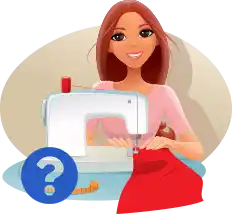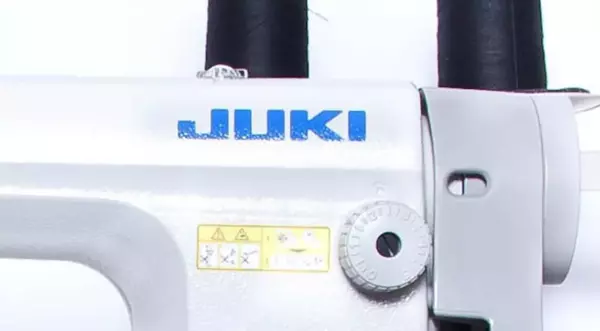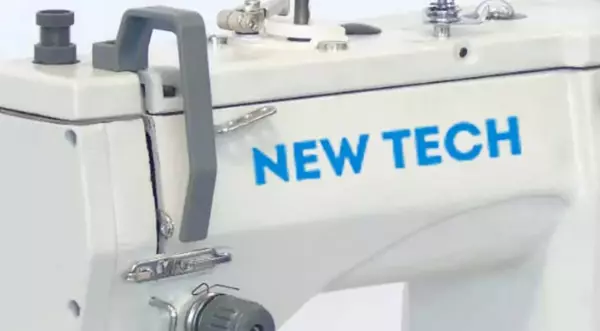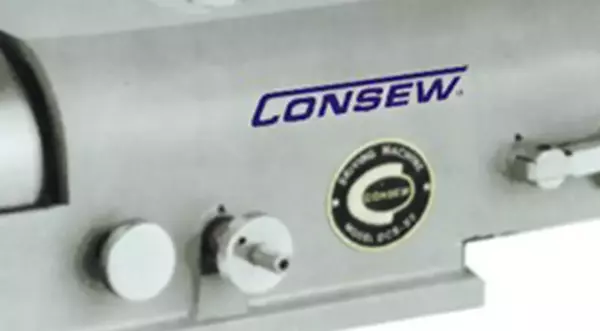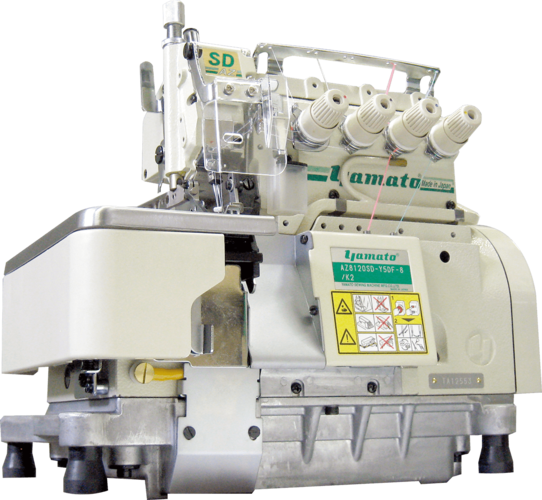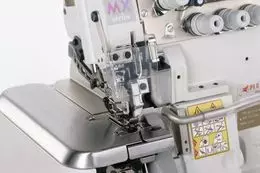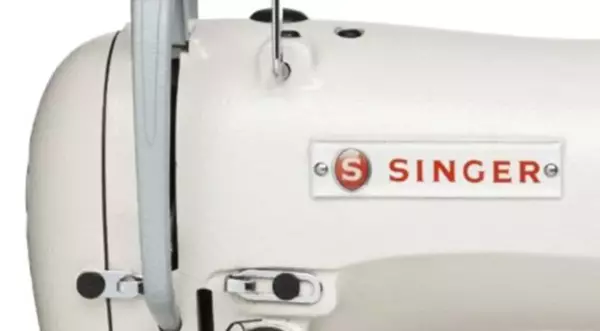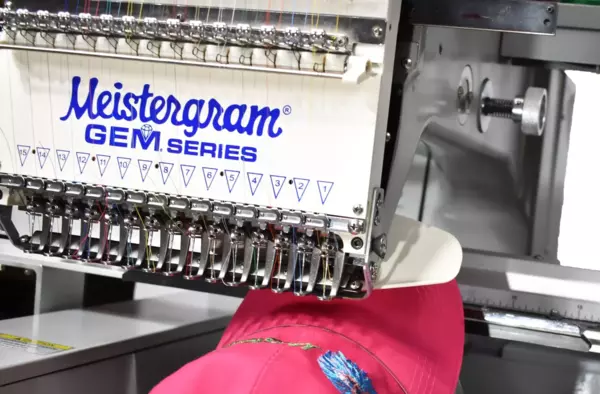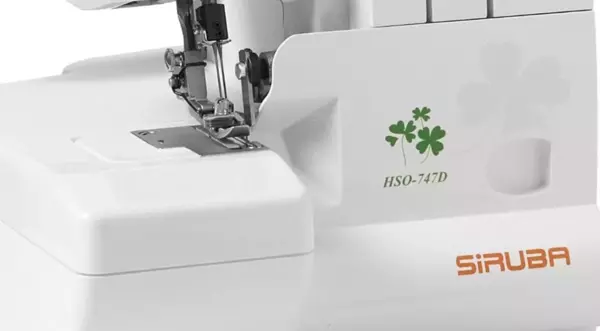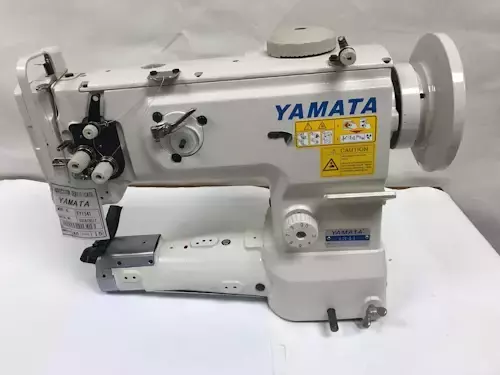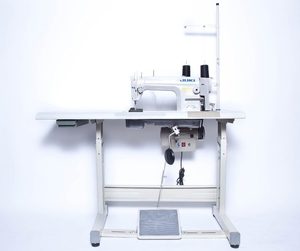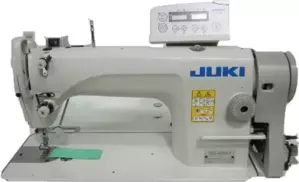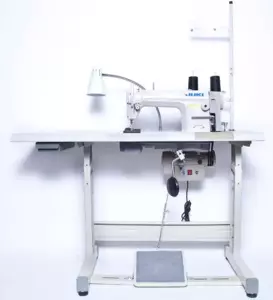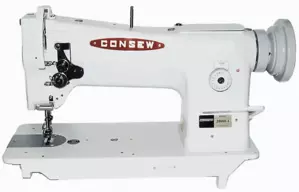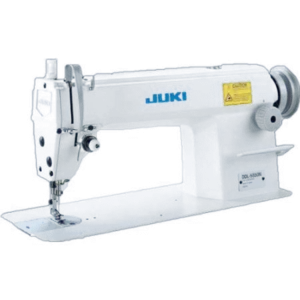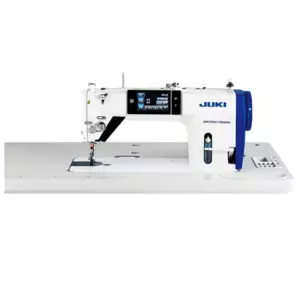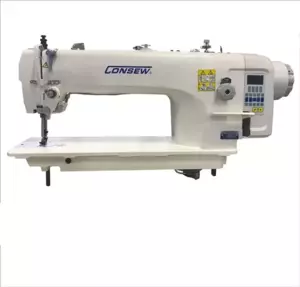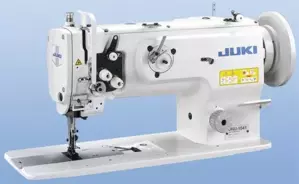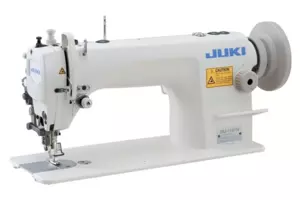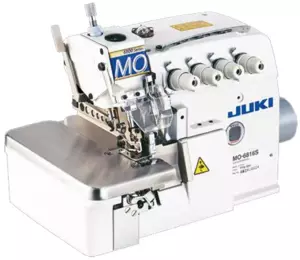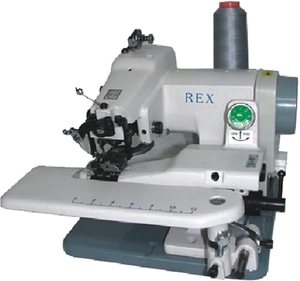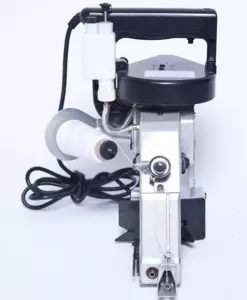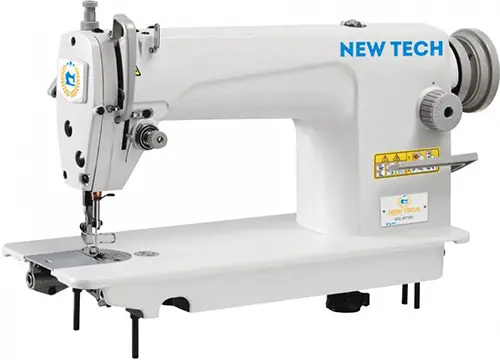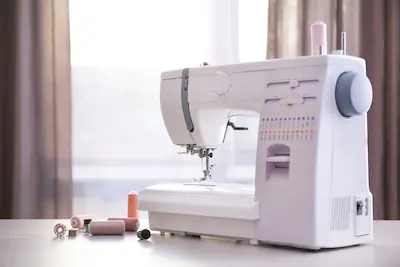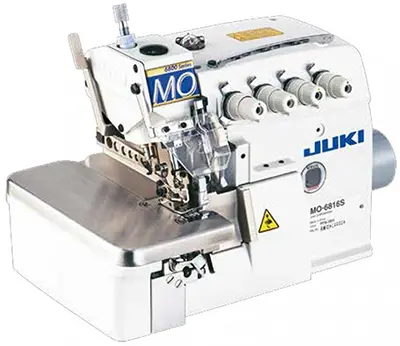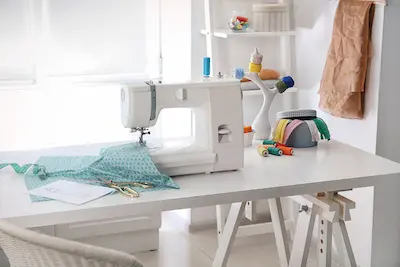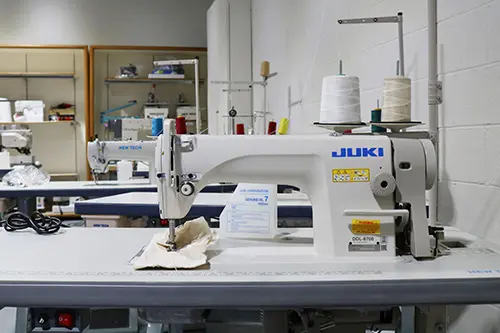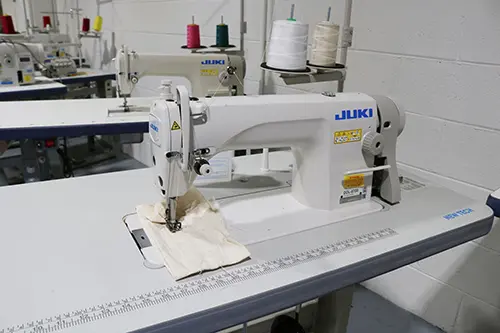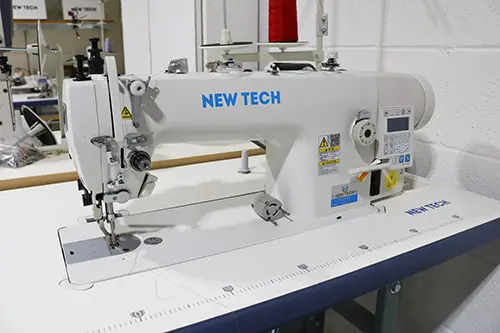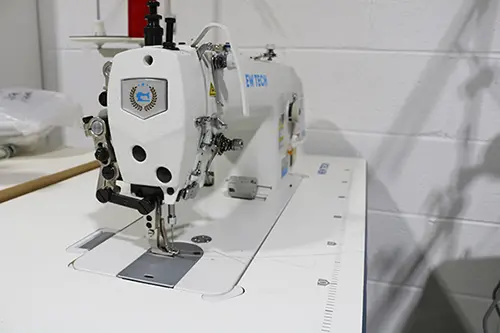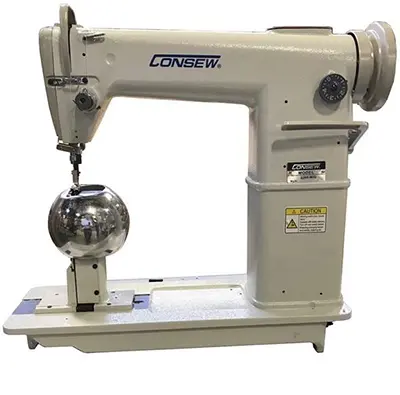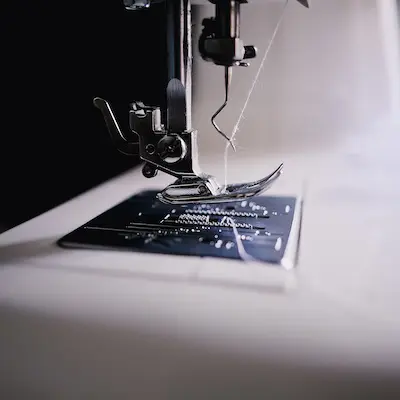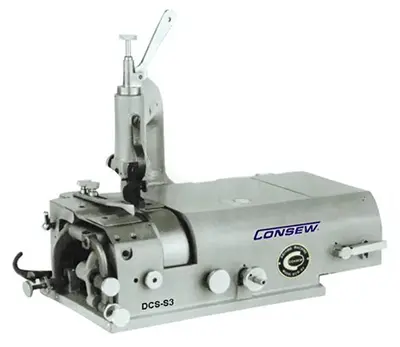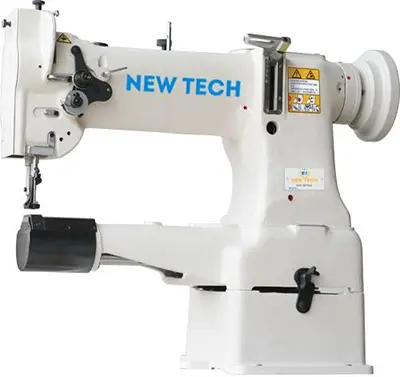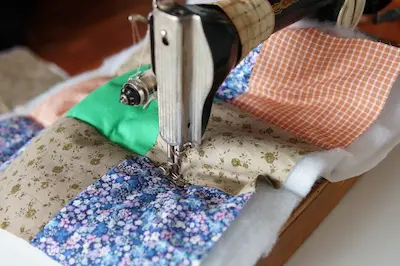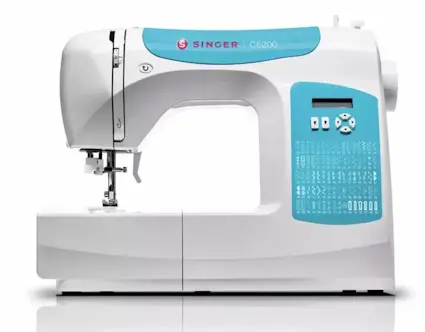GoldStar Tool’s Top Quality Sewing Machines
Whether you are a seasoned sewer, just starting out, like to sew for fun, or sew to keep your business going, we have the sewing machine that is the perfect fit for you. GoldStar Tool carries hundreds of home and industrial sewing machines and equipment for sewers at every level.
We carry some of the most well-known brands equipped with the latest sewing technology. You can even find our very own specialty brand, New-Tech sewing machines, that gives you top-of-the-line quality at an affordable price.
Our sewing machines are sold in a variety of fashions. When buying most of our sewing equipment and sewing machines, you can buy just the head, or you can choose to add on the servo motor, table, or both.
Here are some of the top sewing name brands you will find on GoldStar Tool's catalog:
At GoldStar Tool, we don’t just carry sewing machines. We also carry a variety of quilting machines, skiving machines, and embroidery machines.
The Modern Sewing Machine
Traditionally, sewing machines needed to be manually powered, but today, most machines are electronic, like the ones you will find at GoldStar Tool. Since the 1970s, your machine has been powered by an electric motor that allows for quicker sewing time and broader use.
Modern sewing machines contain mini computers and microchips that help easily control the machine to make more complex stitches. Computerized sewing machines have been around since the mid 80's and a newer models take computerized sewing to a level with seamless connections to PCs or Macs that allow users to update firmware and download new patterns. On the electronic sewing machines, you will find a control panel that allows you to program specific stitch patterns into the machine so it can do most of the heavy work for you.
Businesses worldwide use sewing machines to sew their products, but not all machines are used for heavy-duty industrial purposes.
Many educational institutes use a variety of sewing machines for school, new manufacturing techniques, theater, custom design, uniform mending, and research and development of new fabrics and textile technology.
Millions of people also use sewing machines to sew to create their own personal items and large for themselves, friends, and family. Sewing can be a fantastic hobby or small business that can allow you to be creative and relieve some stress. For many, sewing is a relaxing form of art.
For others, it is a great way to mend old clothes or repurpose vintage garments to save money and reduce waste. Whether you learned how to sew from your parents, friends, YouTube, or by trial and error, sewing is a fun hobby for all ages!
No matter what your reason is that you like to sew, having a suitable sewing machine can make all the difference.
Choosing the Right Machine
Picking out your next sewing machine doesn’t have to be a challenge, either. Whether you are someone who has been sewing for years or a beginner looking for your first sewing machine, there are some considerations you need to ask yourself.
Functions to Consider When Buying a Machine
If you are a beginner, take a look at the basic functions and how easy the machine is to use. Are you someone who wants your machine to have the best technology and a full control panel?
Stitch Lengths on Sewing Machines
Can the sewing machine you are looking at accommodate the stitch lengths you need? If you do basting, you will want to have at least 4mm of length for quick stitch removal, and if you plan on using buttons, the width will also have to be 4mm.
Decorative Stitching and Embroidery Machines
Another thing you want to consider is decorative stitching. Embroidery is a large part of many businesses. Can the machine import patterns? Can the machine embroider on various fabrics? Look for what weights or textures of fabrics the sewing machine can handle.
Sewing Machine Needles
Some sewing machines have automatic needle stops, so you don’t have to do it manually anymore; this is beneficial for sewers of all levels . Isn’t that neat? You don’t have to turn wheels, raise needles from the fabric, or anything! Another item regarding sewing machine needles is to see if they have movable needle holders so you can manually position the needle when sewing zippers or when you are topstitching.
Sewing Machine Tension
Some machines are self-adjusting or have universal tension. Self-adjusting tension and universal tension mean that the thread tension is going to be balanced regardless of the fabric. Many machines still require you to adjust the bobbins or lower the thread tension when you are sewing. This is something you will want to consider when choosing your sewing machine.
Servicing and Repairing Your Sewing Machine
Servicing a sewing machine can be a pain, particularly if your sewing machine is out of warranty. If you are looking for a more complex sewing machine, you will want to ensure that you will be able to get it serviced locally if something were to go wrong, and if it cannot be repaired locally, you will want to see what your options are for sending it out for repairs. Check out this blog for reliable sewing machines! All sewing and embroidery machines
Sewing Machine Weight and Sewing Machine Tables
Size and weight matter when it comes to sewing machines. More prominent, heavy machines will be harder to move around and require more space. Consider where you want your sewing machine to go, and whether or not you will need to move it. Typically, industrial machines are very heavy, while domestic machines are lighter and allow you to move them from place to place.
If you do choose a sewing machine that is heavy, consider purchasing a sewing table. A sewing table is created for different types of machines. Industrial machines are mounted in a specialized type of sewing machine table that also uses a foot pedal, knee pedal and has a place to hold the machine motor underneath the head. These sewing tables are built for strength as well as sturdiness and to reduce vibration during use.
If you are in need of a sewing table for a heavy sewing machine, check out our sewing tables here!
Our Favorite High-End Brands
At GoldStar Tool, we know something about sewing machines... or so we would hope! With this knowledge comes favorites. Learn more about our favorites below.
Juki 8700 Sewing machine
The Juki 8700 is one of our favorites for many reasons. It takes under 1 hour to assemble and all you need is a drill and a wrench! Not only is it easy to set up, but it's great for delicate fabrics. Although, we do recommend switching out your feed dog if you plan on sewing a lot of delicate fabrics. On the flip side, it can also handle heavy leather. You can thank its motor for that. Learn more about the Juki 8700 here.
New-Tech GC-0303D4
A single-needle, straight stitch, top and bottom feed industrial sewing machine is the New-Tech GC-0303D. This machine is perfect for stitching medium-weight fabrics because it was made by New-Tech, a global leader in sewing quality and technology. The presser foot helps pull the fabric with top and bottom feed technology, making it easier to sew medium-weight cloth. The addition of a servo sewing motor makes this device extremely quiet, making it perfect for use at home. The sewing machine head, table, stand, motor, sewing light, drawer, and all other required parts are fully installed and ready to use when this equipment is purchased as a whole.
Modern or Traditional?
As we discussed previously, sewing machines are becoming more and more modern. Are you traditional when it comes to sewing? Or do you want something a bit more updated or computerized? Electronic sewing machines can make adjustments for you, tell you which foot you will need for specific stitches, or automatically change the tension and position based on the type of fabric.
Although electronic sewing machines are helpful and can allow you to work with several layers of fabric and heavier materials, a mechanical/traditional sewing machine is typically more robust and lasts longer.
So You’re New to Sewing, Here Are Some Beginner’s Tips
If you’re new to sewing and buying a sewing machine is intimidating, we have some tips to help! Don’t get discouraged; let us help you with your all-purpose sewing machine!
Breaking Needles
As you sew, your needle keeps breaking. This could be due to the size of the needle you picked. Each sewing machine and fabric is going to call for a different sized needle. For example, silk will require a small, thin needle, but you will need a thicker, stronger needle for quilting.
If you want to make sure you are getting the correct needle for your sewing machine, check out our blog here!
Also, make sure that your needle is straight. Bent needles break easily! And this can ruin your sewing machine. Needles may be small
Uneven Stitching
If your needle keeps breaking, this can cause your stitches to come out uneven. If your needle isn’t damaged, make sure your tension is set correctly, or your thread is correctly set in your bobbin.
Another tip is not to pull too hard, bunch, or force the fabric through the sewing machine. It should be fed gradually and feel natural.
Bunching Thread
If your thread is bunching, it can most likely be solved by rethreading. Bunching is typically caused when your upper thread lacks tension. To resolve this issue, keep your presser foot raised, and rethread. Raise the take-up needle and lever to the highest point to help produce the correct pressure.
Sewing Machines vs. Embroidery Machines
There are important differences between sewing machines and embroidery machines. The primary purpose of both machines is to create stitches using needles and thread, but that’s where the similarities end.
The two main types of stitching in sewing and needlework are construction stitches and design stitches. Sewing machines are made for construction sewing, and embroidery machines are for design work. While some devices will do both, there are highly specialized machines built for each type of sewing.
Sewing machines piece fabrics together using construction stitching. Different stitches, like straight, zigzag, and decorative stitches, create seams. Many sewing machines have features that make it easy to sew buttonholes and blind hems using various stitch lengths and presser feet.
Embroidery machines are sophisticated devices that use computers to stitch everything from simple designs like monograms to complex patterns with different thread types and colors. Instead of presser feet, embroidery machines have hoops that hold the fabric in place, and they can be used with built-in, online, or custom designs.
Each type of machine has a specific purpose, and while they are both valuable tools for people who work with fabric, sewing and embroidery machines are very different.
Industrial Vs. Domestic; What's the Difference?
When buying a new sewing machine, one of the first questions you should ask yourself is, “Do I need an industrial or domestic sewing machine?” Now, when it comes to sewing out of your home, you might be thinking, “Why would I need an industrial sewing machine?” We are here to answer all of your questions about domestic vs. industrial sewing machines.
Industrial Sewing Machines
Although industrial machines are typically used in businesses and factories, industrial sewing machines can deliver high-quality sewing. Industrial machines move at a high-performance speed, allowing you to speed up production time. Industrial machines typically have incredibly powerful motors meaning they can handle heavy-duty thread and heavy-weight fabric such as upholstery material and leather.
Some industrial machines have extras built-in, such as extension tables for quilters, free-motion quilting options, and even sergers. You will have a hard time finding these on domestic machines.
Industrial machines are typically larger and heavier as well. Consider where you want your sewing machine to go and whether or not you will need to move it. Typically, industrial machines are much heavier, while home machines are lighter and allow you to move them from place to place.
If you own a small sewing business or consider sewing a hobby of yours, an industrial sewing machine may be perfect for you.
Industrial Sewing Machine Warranty
Industrial sewing machines from reputable brands like Juki and Consew will always come with a warranty directly from the manufacturer. Many industrial machine models offer a minimum of a one-year warranty, while others offer two to five-year ones on parts and labor. Goldstar offers loaner machines for most industrial sewing machines during warranty repairs.
Domestic Sewing Machines
Domestic sewing machines are built for personal and home use. They can come with embroidery capabilities, fancy stitching, computerized or mechanical. Domestic sewing machines are very versatile, portable, and designed to have add-ons such as presser feet, feeding dogs, embroidery, and more.
Depending on what you are looking for, you can basically customize a domestic sewing machine to fit your personal needs. If you are looking to add to your sewing machine parts, GoldStar Tool has a wide variety of parts here for under-market value! Domestic machines usually are much slower and have a cap on how fast they can go when it comes to sewing speed. This is great for beginners or people who want to teach others to sew. The quality of sewing is not as high with an industrial machine, but the quality can depend on your materials and not just the machine with most projects.
Domestic sewing machines are also much more portable. At the same time, industrial sewing machines are not as easy to move around. If you are looking for a sewing machine that you can take with you on the go, to the office, in your home, or even around the world, a domestic sewing machine will be the best option for you.
For most people, the price of the sewing machine can make a significant impact on their decision-making. Consider how much money you want to invest in your sewing machine. If you are a seasoned sewer, you may not mind investing extra money into your machine; as you know, it will be well worth it. However, if you are a beginner, start with a cheaper machine that will let you learn the basics to sew without breaking the bank.
Sewing Machines from Singer
Since the 1850s, Singer has created a name for themselves as a trusted brand of industrial, heavy-duty sewing machines. They have also branched out to creating durable sewing machines for home and personal use. Singer has been revolutionizing the industry for hundreds of years.
They have a variation of sewing machines that are specifically designed for certain applications. The top three categories for Singer sewing machines are quilting, mechanical, and computerized sewing machines.
Whatever your project and sewing machine preferences, Singer has a sewing machine for you.
Singer Sewing Machines as Quilting Machines
Singer has created a line of power heavy-duty sewing machines that are immaculate for quilting projects. Quilting can get intricate, complex, and have many different styles and patterns. But worry not, Singer sewing machines have extras like LCD screens, lower-able feed teeth, fast drop and sew buttons, stitch sequencing memories, and more to accommodate your quilting needs.
Singer Mechanical Sewing Machines
If you are interested in a mechanical sewing machine, Singer has the right sewing machines for you! Singer has been prided on the quality of their craftsmanship for their mechanical machines. You can get manual settings that allow you to complete seam repairs, alterations, and even hemmings! You can also review their quick threading guides, have easy stitching selections and you even have buttonhole options!
Singer Offers Computerized Sewing Machines
These sewing machines might have started old school in the 1850s, but trust us when we tell you that they have come a long way. Singer has transformed with the times and created computerized sewing machines that give you the option to have automatic sewing, speed, stitch settings, built-in thread cutters, programmable needles, LCD screens, stitch applications, built-in fonts, and different buttonhole styles!
What more could you ask for in the 21st century?
With these convenient and varied options, there will be no stopping you when you take up a sewing project!
Let GoldStar Tool Help You Find the Right Budget-Friendly Sewing Machine!
At GoldStar Tool, we offer a wide variety of sewing machines to fit your needs, from high-end to machines that fit every budget, but sometimes even the most experienced sewer may need some help or have some questions before they purchase.
We have a friendly and knowledgeable staff, ready to answer any questions you may have about any of our products and machines. They can even help you decide which machine is best suited for your needs or help you find a machine that you don’t see on our website. Contact us online, email,
or give us a call at 1.800.868.4419 to speak to one of our representatives.
Common Sewing Machine Questions
Q: Do Any Sewing Machines Have Built-In Thread Cutters?
A: When using a sewing machine without a thread cutter, you’ll be responsible for trimming your threads at the end of each seam. Usually, you’ll need small sewing scissors in order to do this safely, but you could still make mistakes, as you’ll be working with a very thin material in a precarious situation.
Many sewing machine brands and models feature thread cutters to make cutting your thread at the end of your seams easy and in some cases, automatic.
Some major sewing machine brands that feature models with thread-cutting features include Singer, Juki, and Pegasus. Each offers either an automatic thread-cutting feature that is programmable on the machine’s screen or a thread-cutting button you can press when needed.
Q: What Are the Speed Options for Different Sewing Machine Brands and Models?
The ability to adjust your sewing machine’s speed is an important feature to prioritize, especially if you use your machine to sew a variety of fabrics. Many sewing machine models have a lever on the machine that allows you to choose your stitching speed, which likely varies from 50 stitches per minute to 1,000 stitches per minute.
The majority of major sewing machine brands include a control slider for stitching speed, so whether you prefer a machine by Singer, Juki, Kansai, Pegasus, or another brand, you’re likely to have the ability to adjust your stitching speed. If you’re choosing between two or three models, you should probably make your decision based on other features.
Though some sewing machine models are known for their adjustable speed, some advertise high speed for efficient and long-lasting stitching.
Some models like this include the Singer Heavy Duty 4452, which applies 1,100 stitches per minute at full speed, and the Juki DDL-8799 Industrial Sewing Machine, which applies a whopping 5,500 stitches per minute. Generally, the rate of stitches per minute is directly related to the price point of the machine, with a higher stitch rate being more valuable.
Q: Which Sewing Machine Brands Have the Best Reputations for Durability?
Every sewing machine requires some level of maintenance, including tune-ups, cleanings, and oil changes. However, there are several sewing machine brands that are known for their durability. If you’re looking for a sewing machine that will hold up well under heavy use, consider Singer, Juki, Consew, Bernina, and Brother machines.
Q: Will My Sewing Machine Need a Permanent Location, or Is It Portable?
Technically, all household sewing machines are portable, as they aren’t attached to a table, the floor, or a wall.
However, industrial sewing machines that are designed for larger jobs and a variety of materials tend to be cumbersome. Therefore, you should plan to keep it in one place if that’s the type of machine you’d like for your home. It could also be dangerous to move a heavy sewing machine without the proper equipment.
Smaller-scale, domestic sewing machines are much lighter and easier to move, so even though you might find it more convenient to do all of your sewing projects in one place, you’ll be able to move them to a different location if needed.
Before moving a sewing machine, make sure you detach any presser feet or other accessories that could become damaged during the move. Put them in a safe place until your sewing machine is in its new location.
Q: What Are the Best Models for Easy Presser Foot and Needle Changing?
Whether you’re a casual sewing machine user or are at your machine regularly, ease of use is an essential factor. In addition to being efficient and effective at creating high-quality stitches, your sewing machine should make changing presser feet and needles quick and simple.
Making the presser foot and needle-changing processes easy is a priority for the brands we carry at GoldStar Tool. It’s easy to find sewing machine models among our many products that make it easy to perform these tasks.
If you’re new to sewing and want to make sure your machine is easy to learn and understand, try a beginner-level Singer machine like the Singer C5200 or the Singer Tradition 2277.
Q: What Is a Feed Dog?
The feed dog is an integral part of any sewing machine. It is a metal plate with rows of tiny teeth that moves up, down, and back as the machine sews.
The teeth press the fabric against the presser foot, keeping a gentle grip on it as you stitch so that your seam will remain straight and sturdy. The feed dog teeth are helpful with most projects, and some presser feet even have their own feed dogs built in.
Some advanced crafters will put their sewing machine’s feed dogs in the down position, which releases their grip on the fabric and allows the user to have full control over their stitching position and length.
Q: Do Any Sewing Machine Models Have Built-In Bobbin Winders?
Most modern sewing machines have built-in bobbin winders, and the models you’ll find at Goldstar Tool are no different. Bobbin winders can turn a job that would otherwise be tedious into a quick and efficient process.
One example of a sewing machine model that has a built-in bobbin winder is the Consew CN2093R, which is excellent for projects with light to medium fabrics, attaching lace, sewing elastic, and more.
Another example is the New-Tech GC-1790, which is also made with many other desirable features, including a touchscreen control panel and adjustable stitching speed.
Q: Which Sewing Machine Models Come with Additional Presser Feet and Other Accessories?
Every sewing machine model comes with a standard presser foot or zigzag foot included. Many sewing machines, like the Singer 5523, come with a wide variety of stitch types so that you can work on a variety of projects.
Other machines, such as the New-Tech GC-8700, offer buyers the option to include additional accessories in their purchase, such as a needle position controller and automatic bobbin winder.
Q: Do sewing machines come with a warranty?
A 1-year warranty from the date of purchase covers all new sewing machines sold by goldstartool.com. This warranty covers any defects in materials and workmanship of the sewing machine parts, including mechanical and electrical parts, and the cost of labor for repairs performed by an authorized service provider during the warranty period
What's Not Covered:
- Damage or failure caused by improper use, lack of maintenance, accident, abuse, or unauthorized repairs.
- Damage during shipping or transit.
- Normal wear and tear, including scratches and dents.
- Indirect, incidental, or consequential damages, including but not limited to lost profits or loss of use.
